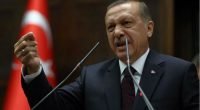Turkey’s recent view from the US

Date posted: January 25, 2014
ARZU KAYA URANLI
“What does Turkey look like from abroad?” is the most common question I’ve been hearing recently when I contact someone in Turkey. What can I say? Since last June, Turkey’s image in the US has noticeably been going somewhere we don’t want to know…
Dan Bilefskyjan in The New York Times indicated last week that “Mr. Erdogan, a conservative Muslim, has often seemed more at home in Tehran or Baghdad than in Berlin or Paris, and in recent years he has sought to fashion the country as a power in the Middle East.” Yet, this is not new. Prime Minister Recep Tayyip Erdoğan has been called an autocrat by Westerners since last June.
Mr. Erdoğan’s arrogance, autocratic impulses and the way he uses anti-Semitic clichés have made him a unique figure in Turkish political history. Since the Justice and Development Party (AK Party) has experienced great success in improving healthcare, raising incomes and improving infrastructure and has been able to push the army out of politics, Mr. Erdoğan has become triumphant and has started acting as a lecturer: He has been telling people how many children they should have (three); whether or not women need abortions; that cesarean sections are not necessary or where and when people can consume alcohol. As a result, a poll last June showed that 54.4 percent of Turks said the “government was interfering in their lifestyles.”
Then the social tsunami started. Since June with the Gezi demonstrations, uncertainties have been ongoing, especially after Dec. 17, 2013, when news of alleged corruption in the current government spread. However, the government’s autocratic moves are much clearer nowadays. The way the AK Party has proposed new laws to increase government control over judges and prosecutors and how many investigations have slowed down have raised suspicions that the government might be trying to hide corruption. The censorship of Turkish media and the recent attempts to change laws about the Internet to easily increase censorship are raising concern.
Strangely, emergency care has been criminalized, too! Under a new law, a doctor faces the risk of being sentenced to up to three years in jail if he attends to an injured person who requires urgent medical attention outside a hospital. It seems as though the law is against doctors’ Hippocratic Oath, which embraces a principle of the Universal Declaration of Human Rights that prioritizes saving lives before anything else.
While all of these are happening at home, Mr. Erdoğan is accusing the investigation of being a politically motivated plot against his government from within the state, especially by the Hizmet movement, led by the highly influential Islamic scholar Fethullah Gülen. Mr. Erdoğan calls the millions of Gülen’s followers around the world a “criminal gang” and ordered Turkish ambassadors to explain to foreign diplomats the recent graft and bribery scandal from a conspiracy-oriented and partisan viewpoint. It seems that the main goal is to discredit the Hizmet movement in an attempt to cover up corruption.
However, if ambassadors blame the Hizmet movement, the most active and influential Turkish civil society movement in the US, who will benefit from it? I bet it won’t be Turkey! It would only demonstrate how vulnerable and helpless Erdoğan is and how he is losing his credibility in the international arena.
Fırat Demir had said in Foreign Policy: “Excuses notwithstanding, the corruption scandal and the government’s response to it have already weakened democratic accountability in Turkey, and deepened dividing lines among an already polarized populace. Once lauded for its democratic strength, or at least its willingness to move up the democratic ladder, Turkey threatens to become just like many others in its neighborhood: a hybrid regime ruled by a strong man who does not even try to give his rule the pretense of a democracy.”
Yes, the way Mr. Erdoğan has behaved shows us he still doesn’t fully understand and has not internalized democracy. He is viewed more and more as an autocrat rather than a democrat. Nevertheless, his defining value should not be majority rule but individual liberty. He has to understand that when a leader implements official authority he depletes the trust he has earned, but when he exercises moral authority, leading by example and treating people with respect, he strengthens it. Can Erdoğan learn these lessons for the sake of Turkey’s near-term stability or it is already too late?
Source: Todays Zaman , January 24, 2014
Tags: Defamation of Hizmet | Democracy | Freedoms | Turkey |
























